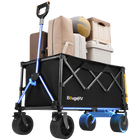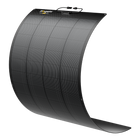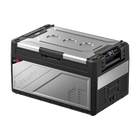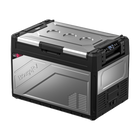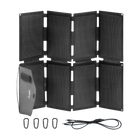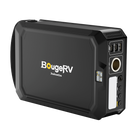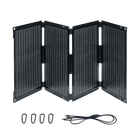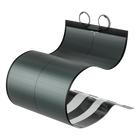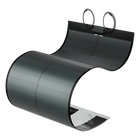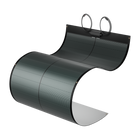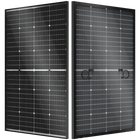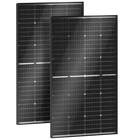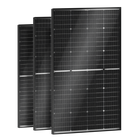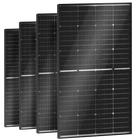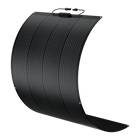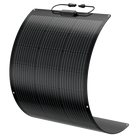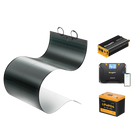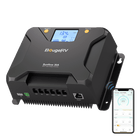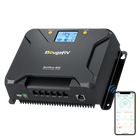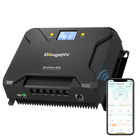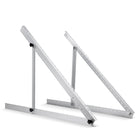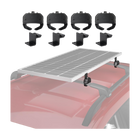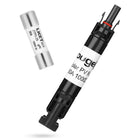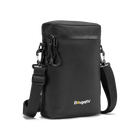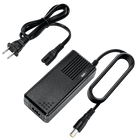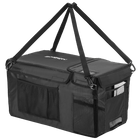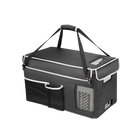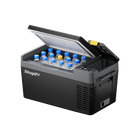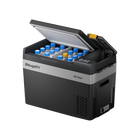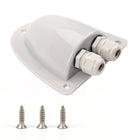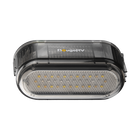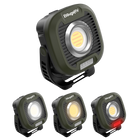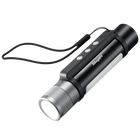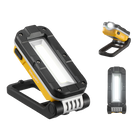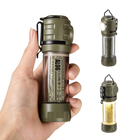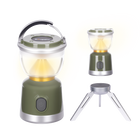How Many Watts Does a Refrigerator Use?


Electricity can be expensive. If you want to save money, it’s helpful to know how much of it each of your major appliances uses. For example, do you know how many watts your refrigerator uses over the course of a day or month? If not, you’re in the right place.
Below, you’ll learn how many watts a refrigerator use over various time frames, as well as tips for saving on power consumption. Keep reading to learn more!
How Many Watts Does A Refrigerator Use?
Let’s start with an overview of the average running watt of different types of refrigerators and freezers. To find out the watts your fridge use, just do a little math:
-
Watt=fridge amps × voltage (usually around 120V).
-
Then divide the watt by 3, because the compressor inside only runs about 30% of the time. And this number is the average running wattage per hour for your refrigerator.
Typically, the average home refrigerator uses between 100 and 400 watts per hour. So, if there’s a power outage, our BougeRV Fort 1500 portable power station is enough to run most of the typical fridges.
But keep in mind the fridge wattage figures are just estimates. The actual wattage consumption of your refrigerator or freezer will depend on a variety of factors, including the brand and model, your usage patterns, and the temperature settings you choose.
Our portable 12V refrigerators with an ECO mode use less than 45W and it consumes less than 1KWh per day!

Besides, if you like to keep your refrigerator and freezer colder than average, then you should expect higher wattage consumption. Similarly, if you have a large household and the refrigerator and freezer are constantly being opened and closed, that could impact the energy efficiency of the appliance.
How Many Watts Does A Refrigerator Use Per Day?
You can figure out how exactly watts your fridge use per day through multiply the average running wattage per hour by 24. For example, the portable power station uses 36W per hour, it requires 36W* 24h= 864W or 0.864KW per day.
If you are not good at calculation, you can find out how many watts your refrigerator use per hour and per day by using our energy calculator via: https://www.bougerv.com/pages/solar-calculator.

How Many Watts Does A Refrigerator Use Per Month?
If you want to know how many watts your refrigerator uses in a month, you can just multiply the daily wattage consumption by 30 or 31, depending on the number of days in the month in question. As said the fridge needs 100-400W to run per hour, so if we multiply each wattage range by 30, then we will figure out a refrigerator needs at least 72KWh per month (100W*24*30=72KWh).
Keeping your average wattage consumption on the lower end, you could save a significant amount on your electricity bills. In order to do that, you need to know which factors impact refrigerator wattage consumption. That way, you can try to play around with each factor to get your average wattage consumption as low as possible.
Factors That Influence Refrigerator Wattage Consumption
There are many different factors that can influence how many watts your refrigerator needs to run on a daily basis, including
-
The type of refrigerator you have: some brands and models with energy-saving modes are able to keep food and drinks cool with less energy than others due to manufacturing differences.
-
The fridge’s size: Larger fridges have more interior space to keep cool. This means they tend to consume more energy.
-
The appliance’s age and condition: Refrigerators can become less energy efficient as they age and become damaged. Newer models tend to use less energy because they work more efficiently.
-
Your usage habits and settings: Frequent door opening can make a fridge less energy efficient. Cooling it below standard temperatures can use more power as well.
-
The location you’re in and its external temperatures: If a fridge is in a hot location, like out in the summer sun on a camping trip, it typically needs to work harder to achieve the same low interior temperatures. This requires more power.
Tips For Reducing Refrigerator Power Consumption

The good news is that there are many different strategies you can try to reduce your refrigerator’s power consumption. For example, BougeRV provides energy-efficient portable 12V refrigerators and fridge covers that make them even more efficient.
You can also try each of the following tactics:
-
Cooling your food down before storing it: The cooler food is before you store it, the less energy it will take to get it to the desired temperature. You may consider bringing groceries home in weatherproof bags.
-
Adjusting the temperature settings: Turning your fridge to a slightly higher temperature is unlikely to damage your food. But it could save you a sizeable amount on your energy bill.
-
Organizing the refrigerator for optimal cooling airflow: Refrigerators have fans inside that blow cool air around evenly. Try to keep these fans unblocked to ensure optimal airflow, as doing so could reduce your fridge’s energy consumption.
-
Minimizing how often you open and close the refrigerator and freezer doors: The more often you open and close your door, the more the outside temperature can heat up the interior of the fridge. Minimizing this can reduce power consumption because the fridge won’t have to work as hard to overcome the higher external temperatures it gets exposed to when the door is open.
-
Cleaning the refrigerator regularly so that it functions optimally at all times: Older, worn-down fridges tend to be less energy efficient. Keeping your fridge clean can ensure it maintains peak energy efficiency for longer into its lifespan.
Can I Keep My Fridge Running During A Power Outage Using A Portable Generator?
Yes, you can absolutely keep your refrigerator running during a power outage with a portable refrigerator. The average home refrigerator can use anywhere from 100 to 800 watts of power to operate per day. So you would need a generator that’s capable of creating at least that many watts if you wanted to power your refrigerator for the whole day or a fraction of those watts for a smaller amount of time.
You also have to consider startup wattage. All appliances need extra watts when they’re being turned on. This varies from model to model, but it can be as higher as double the amount of wattage needed to run the fridge during normal operation.
The good news is that you can plug your refrigerator directly into the generator. Just make sure that you have the right plug and adapter, if necessary. You may also want to consider a portable power station for refrigerators, which is safe to use indoors.
While shopping, just keep in mind that the inverter you purchase needs to have a high enough wattage capacity to meet your fridge’s startup energy needs. Generally, if you can find something that offers 1.5 times the refrigerator’s average wattage consumption, this will be enough.
How To Choose A Portable Power Station For A Refrigerator?

Purchasing a portable power station is a great way to ensure that appliances like refrigerators and freezers can continue running even if the power goes out. These devices also make it possible to bring energy with you while on the go, so you can use a portable fridge while camping.
BougeRV offers a variety of portable power stations with different power ratings and prices to meet a diverse array of needs. If you’re trying to figure out which of these is right for you, consider starting with our 220Wh portable power station for refrigerators.
Or, you can begin by calculating the amount of power that you need to run your fridge with one of our durable portable power stations by completing the following steps:
-
Calculate how much energy your fridge uses over the course of the day
-
Determine the appliance’s startup wattage
-
View BougeRV’s line of portable power stations to find an ideal fit
Conclusion
The bottom line is that you typically need around 100 to 400 watts of energy to power a home refrigerator. But many different factors can impact this, which is why it’s worth calculating your fridge’s energy consumption needs before shopping for a generator that can satisfy them.
If you’re looking for powerful generators that are safe to use inside, consider a portable power station from BougeRV. It could be just what you need to keep your fridge running during power outages while also powering portable fridges and other appliances when you’re on the go.
FAQs
1. Do refrigerators use a lot of electricity?
Refrigerators use about 100 to 400 watts of energy per day, depending on various factors. That’s more than many appliances.
2. How much does it cost to run a refrigerator per day?
The cost of running a refrigerator is typically about $150 per year, which means the average daily cost is around $0.41. However, this depends on energy prices in your area.
3. How much does it cost per month to run a refrigerator?
The average cost to run a refrigerator per month is about $12.50. Once again, that depends on the kind of fridge you have and the cost of electricity in your area.
4. Will a 1000w inverter power a fridge?
Yes, most refrigerators will work fine with a 1,000 Watt inverter. But just make sure that the inverter can handle the startup energy requirements before purchasing.
5. Can solar power run a fridge?
Yes, you can use solar power to run your fridge. But you need panels and a battery system that are large enough to meet your energy needs.
6. Is a 100W solar panel enough for the fridge?
This depends on the type of fridge that you have, but it may not be quite enough for a large home-based refrigerator.
7. How many solar batteries do I need to run a refrigerator?
The number of solar batteries you need to run a fridge depends on each battery’s capacity and whether you’re using it to power other things in your home. But it’s technically possible to run a fridge with one solar battery.


